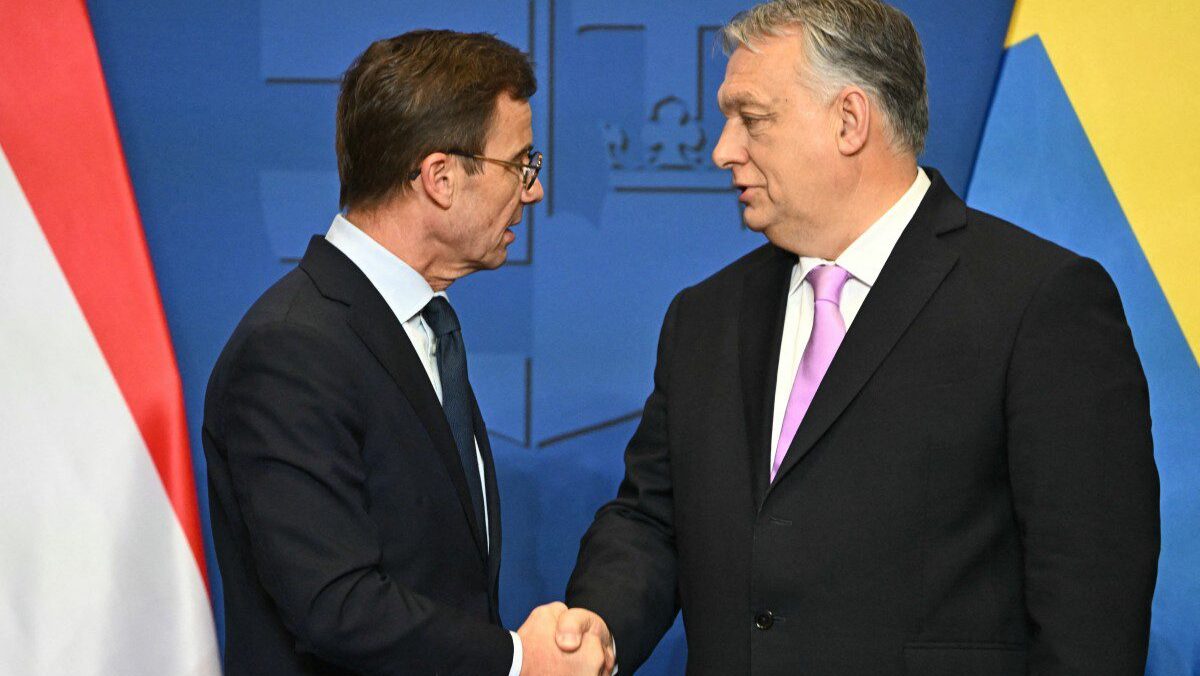
Swedish Prime Minister Ulf Kristersson (L) and his Hungarian counterpart and host Viktor Orban shake hands after a joint press conference in the Prime Minister’s office of Carmelita monastery in Budapest, Hungary, on February 23, 2024.
Photo: ATTILA KISBENEDEK / AFP
Hungary agreed on Friday, February 23rd, to buy four Gripen fighter jets from Sweden—adding to its current total of 14 such aircraft— and to also extend its contract with Sweden to provide support systems and service provision for the planes.
Important agreement today between Sweden and Hungary on the acquisition of four new Gripen fighter jets – a Swedish pride and one of the best systems in the world.
— SwedishPM (@SwedishPM) February 23, 2024
The deal was announced at a joint press conference of both countries’ leaders in Budapest. The meeting between Hungarian Prime Minister Viktor Orbán and his Swedish counterpart Ulf Kristersson was designed to rebuild trust between their nations.
Welcome to Hungary, @SwedishPM ! 🇭🇺🇸🇪 pic.twitter.com/TyuilTifyE
— Orbán Viktor (@PM_ViktorOrban) February 23, 2024
The visit of Ulf Kristersson and the arms deal signed with Hungary also removes the final barrier to Swedish NATO membership, with the Hungarian parliament now expected to approve the admittance of Sweden next week.
To date, Hungary is the only remaining NATO member not to ratify the accession of Sweden—which applied to join the military alliance in 2022—following Russia’s invasion of Ukraine. Politicians from the ruling Hungarian conservative party Fidesz had delayed the ratification in parliament, complaining of unjustified and unfair criticism by leading Swedish lawmakers of Hungary’s conservative policies.
While both Orbán and Kristersson admitted during the press conference that they don’t always see eye to eye on a range of matters, the Hungarian PM said:
To be a member of NATO together with another country means we are ready to die for each other. A deal on defence and military capacities helps to reconstruct the trust between the two countries.
Orbán had earlier in the day told public radio station Kossuth Rádió:
We have to accept, just as the Swedes have to accept, that we are not the same. … Hungary is a Christian country, and Christian values are fundamental in our society. … We are a family-oriented country. … We are pro-peace, and the Swedes are pro-war in the Russian-Ukrainian conflict, so there are obviously clear differences in values between the two countries. But this can be handled, because we don’t want to tell the Swedes how to live and if they don’t want to tell us either, then the possibility opens up for cooperation.
Björn Söder, a member of parliament for the conservative Sweden Democrats—a party that is not part of the centre-right coalition in Stockholm but lends its parliamentary support—believes that ratification of Sweden’s NATO membership by Hungary could have been achieved as early as a year ago. The politician, who has good contacts with government representatives in Hungary, told daily Expressen he had received indications as early as last spring that a meeting between Orbán and Kristersson would be required in exchange for Hungary’s approval, but the proposal was “brushed aside and ignored.”
Söder, claims that both sides of the political spectrum in Sweden are responsible for the frosty relationship with Hungary, with Ulf Kristersson and Foreign Minister Tobias Billström playing a part in the events that led Fidesz to leave the European People’s Party.
Certain issues had also angered Hungarian conservatives with regards to Sweden, including the fact that Swedish children are taught in schools that Hungary is not a democracy. Sweden has also joined a European Commission lawsuit that challenges Hungary’s child protection law—seen by Eurocrats as discriminating against LGBT people—as it prohibits the promotion of homosexuality or gender transition in schools and media.
By forging closer ties, Orbán and Kristersson have made it clear that differences of domestic policy should not prevent cooperation in matters of national defence.
